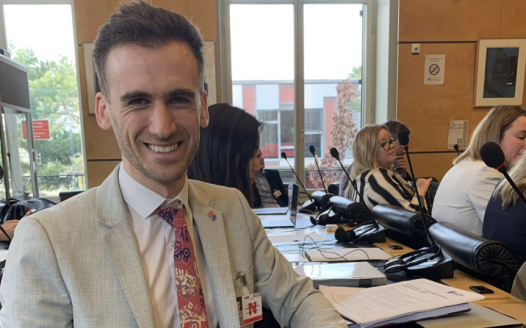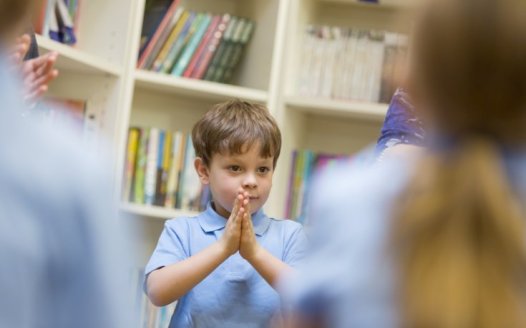Students should be free to excuse themselves from worship
Posted: Fri, 14th Dec 2018 by Stephen Evans
After two students pushed the Welsh government for a response to a petition to remove schools' obligation to hold acts of worship, Stephen Evans says pupils should be free to opt out of religious practices in schools.
Worship in schools hit the headlines again this week when two Welsh school students reprised their call for pupils not to be forced to take part in daily prayers.
Rhiannon Shipton and Lily McAllister-Sutton launched a petition last year calling on Welsh assembly members to end the obligation on schools to hold collective worship. According to the BBC, their school - Ysgol Glantaf – responded by making changes to prayers, but the pair say the practice during assemblies has now returned. The students have nothing against religion per se, but do not see why they, or other nonbelievers, should be compelled to join acts of worship.
Quite right. But according to English and Welsh law, all pupils attending state schools should "take part" in a daily act of collective worship. Even in schools with no religious designation, the worship must be "wholly or mainly of a Christian character".
The law is largely a dead letter and effectively unenforced. Faced with mass non-compliance, Ofsted stopped policing this requirement 14 years ago. The line from England's Department for Education is that schools are free to interpret the law how they see fit. Many school leaders respect the diversity within their schools and opt to hold inclusive assemblies. But for as long as the law remains in place, religious enthusiasts within the teaching profession will have license to impose their religious beliefs and practices on the pupils in their care.
Parents have the right to withdraw their children from school worship, but it's a right seldom exercised – not least because of the concern that it might make school life uncomfortable for their children, and make them feel excluded.
Since 2006, sixth-formers have had the right to withdraw themselves – thanks partly to NSS campaigning. But is this limited right really sufficient to protect young people's rights and freedoms?
The UN committee on the Rights of the Child (UNCRC) says not. Following a recent review of the UK's compliance with human rights obligations, it urged governments within the UK to ensure that children can independently exercise the right to withdraw. We've since lobbied ministers in all four constituent countries of the UK to reform the law around collective worship and religious observance in light of comments from the UNCRC.
In less enlightened times, parents were seen as having right of ownership over their children. More recently, children and young people have been recognised as individuals with their own independent human rights. With the development of international human rights norms, the absolute power of parents over children has been replaced by an interweaving of law, custom and judgement.
The Gillick Principle, which originates from a House of Lords case in which a Roman Catholic mother failed to prevent doctors prescribing contraception to her under-16 year old daughters without her consent, further established children's independent rightsAs Lord Scarman noted in the landmark case: "Parental right yields to the child's right to make his own decisions when he reaches a sufficient understanding and intelligence to be capable of making up his own mind on the matter requiring decision."
This principle must now apply to worship in schools. There should be no compulsion in religion. Education is non-negotiable, but if young people don't want to pray or perform other religious rituals during the school day, nobody should have the power to make them.
Religious freedom preserves an important opportunity for choice. That right belong to everyone – including non-religious youngsters and those of minority faiths. The fact that Christianity has historically been the dominant religion in Britain is no excuse to impose it on those that don't follow it today.
Rhiannon Shipton and Lily McAllister-Sutton will soon be leaving school, but I'm hopeful that their principled stance will pave the way for future Welsh students to exercise their religious freedom. Following our lobbying of the Welsh government, Kirsty Williams, the cabinet secretary for education in Wales, has told us she is considering matters relating to collective worship and will publish further details in due course. I remain optimistic that she will remove the collective worship requirement from schools, or at least extend the right to withdraw to pupils.
The situation in England, where the established church holds more sway and Anglican bishops sit in the House of Lords as legislators, is perhaps a different story. But sooner or later we shall get rid of compulsory worship in all state schools, and the sooner the better.
End compulsory worship
No child should be compelled to pray in school. Join our campaign.








